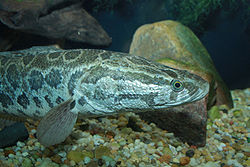Channoidei
| Snakehead | |
|---|---|
 |
|
| Northern snakehead, Channa argus | |
| Scientific classification | |
| Kingdom: | Animalia |
| Phylum: | Chordata |
| Subphylum: | Vertebrata |
| Class: | Actinopterygii |
| Order: | Perciformes |
| Suborder: | Channoidei |
| Family: |
Channidae Fowler, 1934 |
| General | |
|
|
The snakeheads are members of the freshwater perciform fish family Channidae, native to parts of Africa and Asia. These elongated, predatory fish are distinguished by their long dorsal fins, large mouths, and shiny teeth. They breathe air with gills, which allows them to migrate short distances over land. They have suprabranchial organs developing when they grow older, which is a primitive form of a labyrinth organ. The two extant genera are Channa in Asia and Parachanna in Africa, consisting of about 40 species.
They are valuable as a food source and have become notorious as an intentionally released invasive species.
The various species of snakeheads differ greatly in size. Dwarf snakeheads, such as Channa gachua, do not surpass 25 cm (10 in) in length. Most other snakeheads reach between 30 and 90 cm (12 and 35 in). Five species (C. argus, C. barca, C. marulius, C. micropeltes and C. striata) can reach 1 m (3 ft 3 in) or more.
Snakeheads are thrust-feeders that consume plankton, aquatic insects, and mollusks when small. As adults, they mostly feed on other fish (such as carp) or on frogs. In rare cases, small mammals such as rats are eaten.
...
Wikipedia
